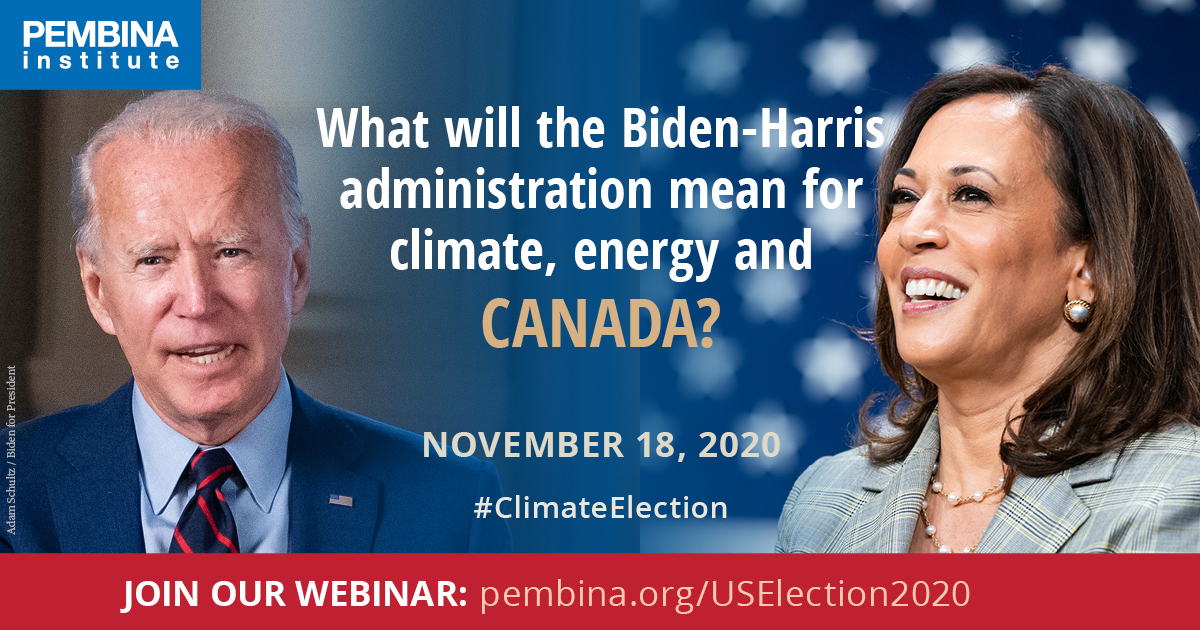Regardless of who wins the U.S. presidency, leadership on climate change south of the border will continue in states and cities already leading the charge. The election outcome will, however, determine if they’ll be joined by their federal government. As the Democratic leadership process revealed, action on climate change would be a centrepiece of a Democratic administration and a key component of economic recovery from the COVID-19 pandemic.
That would be good news for climate action, and for Canada. Joe Biden’s commitments on climate, and his commitment to an equitable, just recovery, wouldn’t just bring the U.S. into alignment with Canada and the international community, it would raise the bar and increase the pace, creating both competition and opportunities for Canada.
We at the Pembina Institute examined the climate commitments in the Biden platform and compared them against Canada’s climate commitments to see what a Biden administration would mean in terms of alignment, or lack thereof, in their approaches to rebuilding the economy. Five key themes emerged — with potentially major implications for climate action in Canada and around the world.
1. Putting equity at the forefront
The Biden platform promises to ensure that “no one is left behind” in the transition to clean energy. He has pledged that low-income communities, communities of colour, and Indigenous communities — which often suffer the brunt of pollution — will be “first to benefit” from massive investments in clean energy infrastructure.
Canada can learn from Biden’s emphasis on equity, justice, and jobs as we anticipate a new climate plan and await the Trudeau government’s promised legislation to support workers and communities disproportionately impacted by the transition to a lower carbon global economy. Canada can do much more to improve access to clean and affordable energy, address economic and social disparities, and provide opportunities for workers in communities and industries that need economic diversification.
2. Renewed momentum to net-zero emissions
Biden has promised to recommit to and reinvigorate the Paris Agreement, by leading a push to get major countries to increase the ambition of their climate targets. Our neighbour’s return to Paris means Canada and the U.S. will share a common goal of limiting warming to 1.5 Celsius.
U.S. leadership on pathways to net-zero and climate accountability would be a shot in the arm for these efforts. We need robust pathways, carbon budgets, and accountability mechanisms on both sides of the border to make sure action matches ambition.
3. Economic opportunities and risks
North American alignment on climate and energy policy should translate into bigger market opportunities for Canadian electricity exports, clean technologies, and low-carbon goods and services. However, it could also mean greater competition for market share. Biden’s commitment to boost sales of electric vehicles should also benefit Canadian exports of minerals required for batteries.
Biden has expressed his willingness to impose carbon border adjustment tariffs or quotas on carbon-intensive imports from climate lagging countries. The potential for these tariffs to be applied to Canadian imports could help bolster ambition on carbon pollution pricing and the clean fuel standard in Canada.
4. Alignment on industrial decarbonization
A Biden administration would, at a minimum, reinstate the methane reduction requirements repealed by the Trump administration or potentially set more ambitious targets for methane pollution in the oil and gas sector. Canada needs to deliver on its recent commitment to ensure the 2025 methane emissions reduction target is met. This commitment will help make our energy industry more competitive as the world shifts to a low-carbon economy, and maintain our position as a global leader on methane abatement technology, which will be increasingly in demand as countries around the world move to decarbonize. Biden would also double down on federal investments and enhance tax incentives for carbon capture, utilization, and storage, and invest in further research.
5. Increased ambition on clean energy
In promising a “carbon pollution-free power sector by 2035,” Biden is upping the bar for ambition on clean electricity north of the border. Canada has committed to a 90 per cent non-emitting grid by 2030 and 100 per cent by 2050. Biden has also pledged to invest in research to bring down the cost of producing zero-carbon hydrogen from renewable energy to the cost of hydrogen made from shale gas.
Regardless of the outcome of the election, the Canada-U.S. relationship on energy will have its complications. But Canada and the US would at least be poised to row together toward a prosperous, more equitable, net-zero economy, at a faster pace, using so many of the tools available through our respective climate and energy policies — including pricing carbon, methane reduction, clean fuel standards, and climate impact assessment.
Biden’s climate plan is his economic plan, and vice versa. With growth comes greater ability to improve access to affordable, clean energy, address disparities and create opportunities for workers in contracting industries. Alignment with our neighbour and biggest trading partner will put a more inclusive, low-carbon recovery within closer reach.
This op-ed originally appeared in the Hill Times on November 2, 2020.








